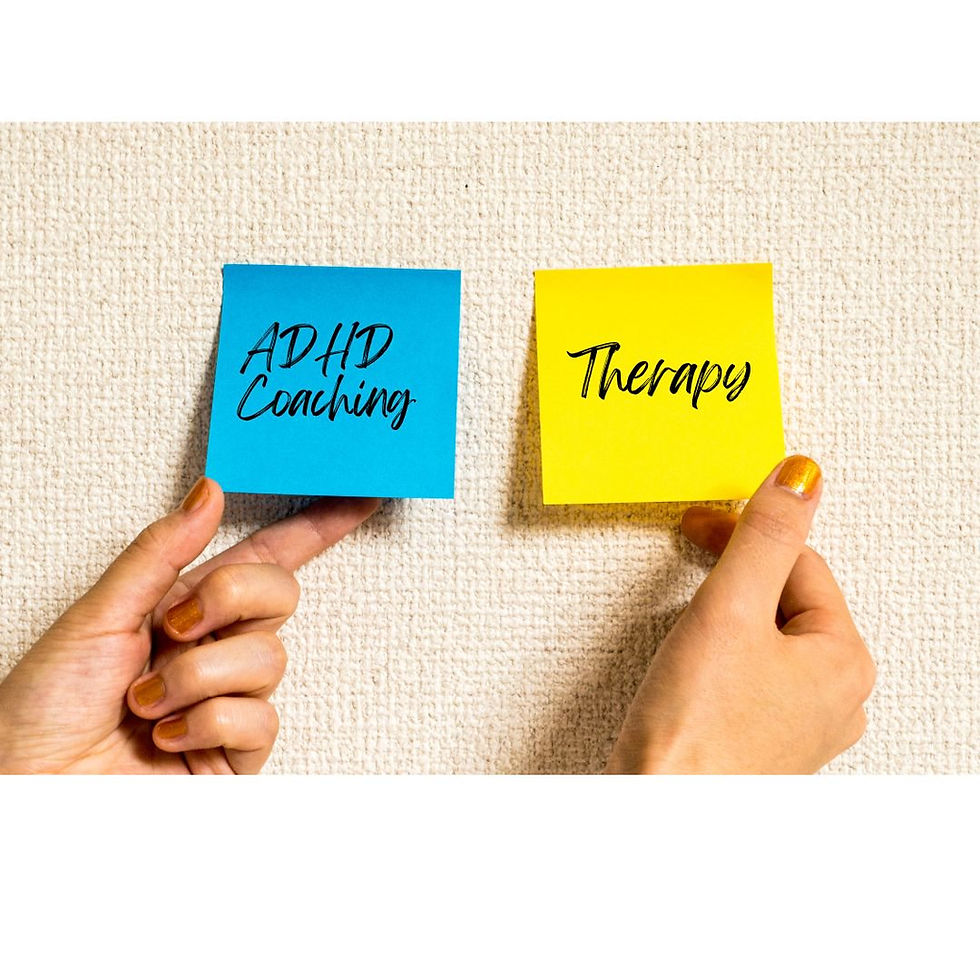Therapy for ADHD: What to Look for and How to Start
- Nov 24, 2025
- 4 min read
Finding a therapist can feel like a big step. Whether you're looking for support with ADHD, anxiety, burnout, or emotional regulation, the process of finding the right fit matters just as much as the therapy itself.
At Agave Health, we often hear questions like: “How do I know if someone’s legit?” “Is it weird to ‘shop around’ for a therapist?” “What if it’s not working but I’m too uncomfortable to say something?”
These questions are valid, and you’re not alone in asking them. The truth is, therapy is personal. And not every therapist will be the right fit for every person. So here’s what to keep in mind when searching for the support you deserve.
November 2025, Rebecca Branham, ADHD Coach @ Agave Health

What Makes a Good Therapist for ADHD?
It’s easy to start by filtering for logistics, like availability, insurance coverage, or location, but emotional safety and connection are just as important. Here are a few key things to consider:
✅ A trauma-informed, neurodivergent-affirming approach
Especially if you live with ADHD or related challenges, it’s important to work with someone who gets your experience. A neurodivergent-affirming therapist will not try to “fix” your brain. Instead, they’ll help you work with it in ways that feel empowering.
At Agave Health, all our providers are trained in neurodivergent care. You can check availability in your state here.
✅ Comfort and rapport
Therapy only works if you feel safe enough to be honest. In the first few sessions, ask yourself:
Do I feel seen and respected?
Is the therapist listening, or just jumping to advice?
Do I feel comfortable being imperfect here?
You’re allowed to “try on” different therapists to find the one that clicks. It’s not dating... but it’s not far off, either.
✅ Training and Credentials
Make sure your therapist is licensed in your state and trained in the type of care you’re seeking. Here’s a breakdown of some common credentials and what they mean:
LCSW (Licensed Clinical Social Worker): Trained to provide talk therapy and support around life challenges, relationships, trauma, and mental health conditions. Often experienced in community-based and systems-level care.
LMFT (Licensed Marriage and Family Therapist): Specializes in relationship dynamics and family systems. Great for couples counseling or if your challenges are tied to interpersonal patterns.
LCPC or LPC (Licensed Clinical Professional Counselor or Licensed Professional Counselor): General mental health providers trained to offer therapy for anxiety, depression, ADHD, trauma, and more. Often focused on one-on-one work.
PhD or PsyD (Clinical Psychologist): Psychologists with advanced training in therapy and psychological testing. A PhD may also focus on research, while a PsyD is more practice-oriented. Some offer formal evaluations for ADHD, autism, etc.
PMHNP (Psychiatric Mental Health Nurse Practitioner): A nurse practitioner who can prescribe medication and some may also provide limited therapy. Often works alongside a talk therapist as part of a care team.
You can verify a therapist's credentials and licensure through your state licensing board.
Where to Start Your ADHD Therapy Search
If you're not sure where to begin, here are some reputable directories and tools:
Agave Health: If you're looking for therapy that understands ADHD, emotional regulation, and executive function, start here. We offer virtual therapy and adult ADHD evaluations.
Your insurance provider’s website: Most insurers have a directory of in-network mental health providers you can filter by specialty, credentials, and location.
Word of mouth: Sometimes the best recommendations come from trusted friends, family, or even your primary care provider. If someone you know had a positive experience, it can be a good place to start.
Psychology Today: A large national directory where you can filter by location, insurance, specialty, and therapy type. You can also use Psychology Today to find other types of mental health care like psychiatrists, treatment centers and support groups.
Inclusive Therapists: A directory centering marginalized populations, cultural sensitivity, and affirming care.
TherapyDen: A modern directory with inclusive filters and detailed bios.
Is It Time to Switch Therapists?
It’s okay if your first (or third) therapist isn’t the right fit. But before switching, it can help to pause and reflect. Sometimes discomfort in therapy comes from doing hard emotional work or from the vulnerability that comes with opening up. And if you experience rejection sensitivity, it’s easy to interpret misunderstandings as personal judgment.
That said, if something still feels off after a few sessions—or you’ve brought up concerns and nothing’s changed—it might be time to move on. Some signs to look for:
You feel judged, dismissed, or misunderstood
Sessions feel stagnant or unhelpful
The therapist talks more than you do
You’re masking or withholding what you really think or feel
Remember: you are not “difficult” for needing the right kind of support. Therapy should feel like a space where you can be your whole self, even on the messy days.
What to Ask in a First Therapy Session
Not sure how to assess fit in the first session? Try asking:
Have you worked with clients who have ADHD or executive dysfunction?
What is your approach to emotional regulation?
How do you typically structure sessions?
How do you handle feedback if something isn’t working?
Therapists are professionals, but they’re also humans. A good one will welcome your questions and want to build a relationship that works for you.
Finding Support That Fits
Finding the right therapist is not about finding a “perfect” one. It’s about finding someone you feel safe with, who has the skills to support your specific needs.
At Agave Health, we believe that mental health support should feel empowering, accessible, and aligned with who you are, not who the world says you should be. If you’re ready to explore therapy, see if we offer services in your state and take that next step with confidence.
You deserve support that gets it. And you don’t have to figure it out alone.

Comments